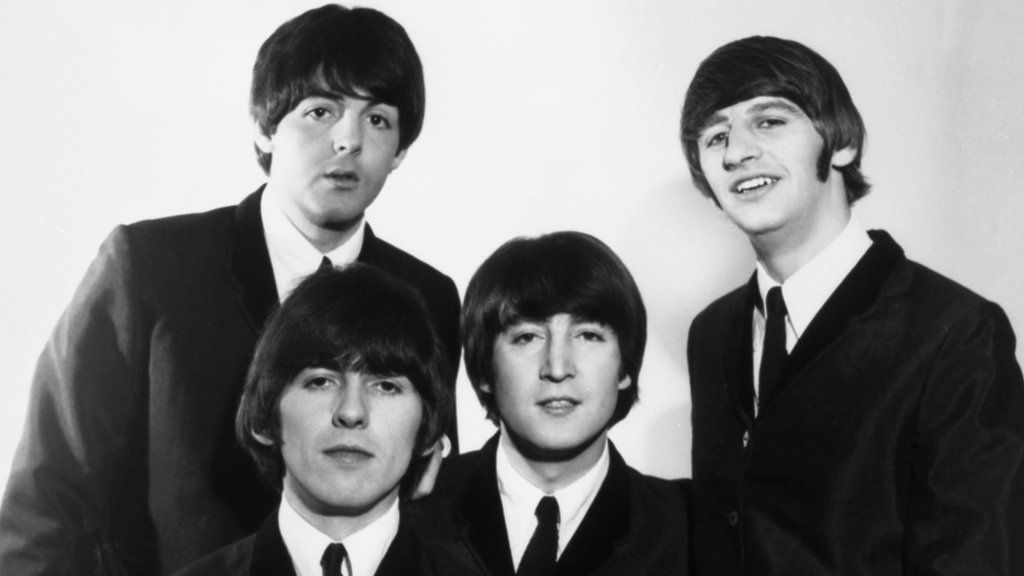Tributes to Beatles promoter Tony Calder
- Published

Music promoter Tony Calder, who helped The Beatles score their first hit single, has died at the age of 74.
He started his career at Decca Records in the 1960s and went on to work with the Beach Boys, Marianne Faithfull, Black Sabbath and Eddy Grant.
The executive also co-founded his own independent record label, signing acts like Rod Stewart and Fleetwood Mac.
Andrew Loog Oldham, his former business partner, tweeted: "A member of the family has left us."
Allow Twitter content?
This article contains content provided by Twitter. We ask for your permission before anything is loaded, as they may be using cookies and other technologies. You may want to read Twitter’s cookie policy, external and privacy policy, external before accepting. To view this content choose ‘accept and continue’.
Born in Surbiton, Surrey, to Scottish parents in 1943, Calder was one of the busiest agents on the music scene of the 1960s, working at Decca Records by day and as a DJ for Mecca dancehalls by night.
In 1962, he was tasked with promoting the Beatles' first single, Love Me Do.
"It was not getting radio play and after the first week they were in panic," Calder once told BBC Radio 2.
"And that's when I thought, 'This fills all the Mecca dancehalls that I play at - let's do that round the country.'"
So he personally sent 100 copies of the single to clubs all over the UK, with a note saying it was a guaranteed floor-filler.
"We mailed it on the Monday. By Wednesday, they were all playing it," he recalled.
That, in turn, created demand for the song in local record stores, and helped The Beatles reach number 17 in the UK charts.
"The record was struggling and it picked up - and that's how we got it away," said Calder.
A few years later, he joined forces with Rolling Stones manager Andrew Loog Oldham to launch a PR company, Image. Together, they helped cement The Rolling Stones' reputation as the bad boys of British rock.
"In those days you couldn't get pop stars on the front page of a national paper," he once said.
"It took a report of Mick urinating on the wall of a petrol station to do that, when actually it was Bill Wyman.
"Andrew and I sold that story. We got 10 quid each for it."
Outside of his promotional duties, Calder also produced Marianne Faithfull's top 10 hits Come and Stay With Me and This Little Bird.
In 1965, Calder and Oldham founded formed UK independent label Immediate, whose artists included Rod Stewart, Fleetwood Mac, PP Arnold and the Small Faces.
However, the label lost millions of pounds and was embroiled in legal disputes for years after it collapsed in 1970. The Small Faces famously only started to receive royalties for albums like Ogden's Nut Gone Flake in 1997.
In the 70s, Calder signed groups Black Sabbath and managed Eddy Grant. He was credited with saving Grant's I Don't Wanna Dance from being a forgotten demo when he pushed for its release as a single.
He also signed The Bay City Rollers, but not on their artistic merits.
"I saw them play live in Edinburgh early on, and they were atrocious," he told The Herald in 1995.
"But there were police outside holding back lines of screaming kids... so I thought I'd grab a stake in some of that.''
He remained active in the 80s and 90s, helping novelty band Jive Bunny score three consecutive UK number one hits; and enjoyed success with his publishing company, Marylebone Music.
Calder and Oldham also wrote a book on Abba in the 1990s, which was widely derided by fans, who claimed it was riddled with factual inaccuracies.
According to reports, Calder died of complications from pneumonia at the Chelsea and Westminster Hospital in London.
His friend, Mark St. John, paid tribute: "Tony was a polarising character, but, love him or hate him, he was one of a kind and a huge, huge part of creating and consolidating the music industry at a time when it was still in its Wild West phase."
Oldham told Variety magazine: "Tony had ears and balls. I loved him and he will be missed."
Follow us on Facebook, on Twitter @BBCNewsEnts, or on Instagram at bbcnewsents. If you have a story suggestion email entertainment.news@bbc.co.uk.
- Published9 March 2016
- Published30 December 2017
- Published6 October 2016